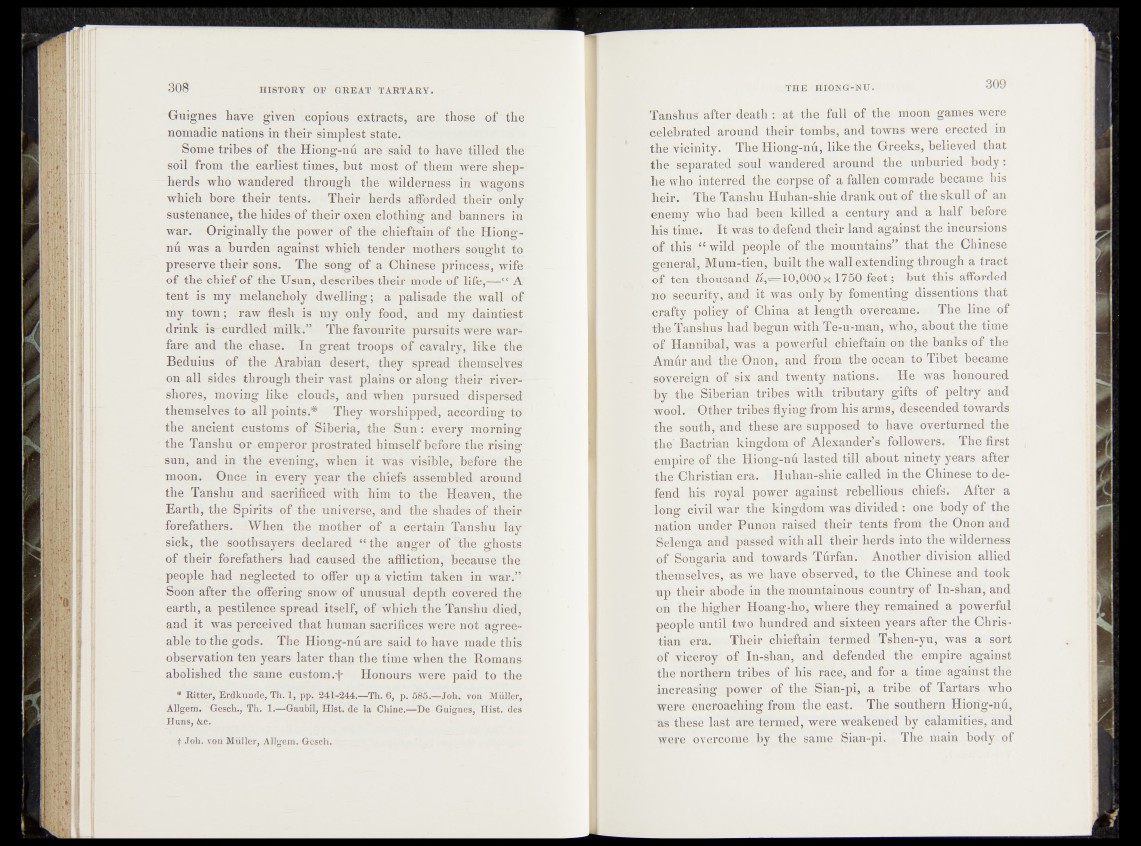
Guignes have given -.copious extracts, are those of the
nomadic nations in their simplest state!
Some tribes of the Hiong-nü are said to have tilled the
soil from the earliest times, but most of them were shepl
herds who wandered through the wilderness in wagons
which bore their tents. Their herds afforded, their only
sustenance, the hides of their oxen clothing and banners in
war. Originally the power of the chieftain *iff the Ilioiig-
nü was a burden against which tender mothers sought to
preserve their s_ons. The song of a Chinese princess, wife
of the chief of the Usun, describes their mode of life,-^* A-
tent is my melancholy dwelling; a palisade the wall of-
my town; raw flesh is my only food, and. my daintiest
drink is-eurdled milk.” The favourite pursuits wérëwarfare
and the chase. In great troops of cavalry, like , the
Beduius of the Arabian desert, they spread themselves'
on all sides through their vast plains or aloutg^their river-
shores, moving like clouds, and when pursöëd^disperÉeèd
themselves to all points.* They worshipped, according-fd?
the ancient customs of Siberia, the Sun: every morning'
the Tanshu or emperor prostrated himself before1 the rising
sun, and in the evening, when it was visible,' bèforè^vthe-
moon. Onee in., every year the chiefs assembled around
the Tanshu and sacrificed with him to the "HeaVemfv th&
Earth, the Spirits of the uni verse, and the* shades'of their
forefathers. When the mother of a certain Tanshu- lay
sick, the soothsayers declared “ the anger oi the ghbsts
of their forefathers had caused thè affliction, becauséïthe
people had neglected to offer up a victim taken Étf war.”
Soon after the offering snow of unusual depth covered the
earth, a pestilence spread itself, Of which the Tanshu died,
and it was perceived that human sacrifices were not agree*
able to the gods. The Hiong-nu are said to have made this
observation ten years later than the time when the Romans
abolished the same custom .f Honours were paid to the
* Ritter, Erdkunde, Th. 1, pp. 241-244.—Th. 0, p. 585.—Johr. von Muller,
Allgem. Geseli., Th. 1.—Gaubil, Hist, de la Chine.—De Guignes, Hist, des
Huns, &c.
t Joh. von Muller, Allgem. Gesch.
Tanshus after death : at the full of the moon games were
celebrated around their tombs, and towns were erected in
thf vicinity. The Hiong-nu, like the Greeks, believed that
the- separated söiul wandered around the unburied body:
he who interred the^corpse of a fallen comrade became his
heir. The Tanshu Huhin-shie drank out of the skull of an
enemy who had been killed a century and a half before
his time. It was to defend their land against the incursions
of this “ wild people, of the mountains” that the Chinese
general, Mum-tien, built the wall extending through a tract
of ten thousand Z^=#l',0ÖÖ-.x-l'750 feet; but this afforded
no security, and it was only-by fomenting dissentions that
crafty policy:of ..China at length overcame.- The line of
#he Tanshus had begun with Te-Urinan^who, about the time
of Hannibal, was a powerful chieftain o® the banks of the
Amur and theOnon, and from, thefodean to Tibet became
sovereign'll six and twenty nations*,5 He was honoured
by the Siberian tribes with tributary gifts of peltry and
wool. ' Other tribes flyingfeona his armsj descended towards
the s%uth, and these are supposed-, to have overturned thé
the' Bactrian kingdotn;of Alexander’s followers. The first
empire of the Hiong-nu lasted till about ninety years after
the Christian era. iluhan-shie called in the Chinese to defend
his royal power against rebellious chiefs. After a
long civil war the kingdom was divided : one body of thé
nation under Punon raised their tents front the Onon and
§'#elenga' and passed with all their herds into the wilderness
, of Songaria and towards-Turfan. Another division allied
themselves, as we have observed* to the Chipege; and took
up their abode in the mountainous country of In-shan, and
on the higher Hoang-ho, where they remained a powerful
people until two hundred and sixteep, years after the Christian
era. Their chieftain termed Tshen-yu* was a sort
of viceroy of In-shan, and defended the empire against
the northern tribes of his race, and for a time against the
increasing power of the Siampi, a tribe of Tartars who
were encroaching from the east. The southern Hiorig-nü,
-tts these last are termed, were weakened by calamities, and
were overcome by the same Sian-pi. The main body of